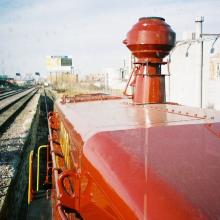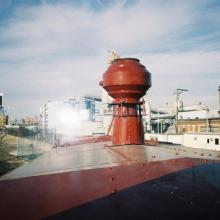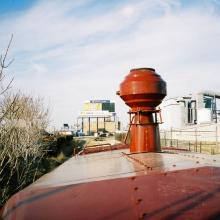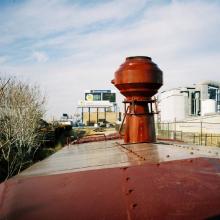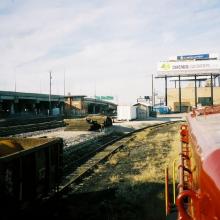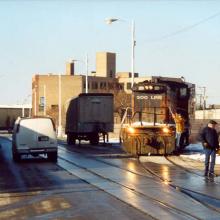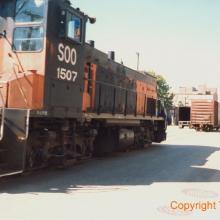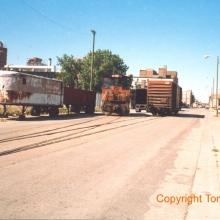861 Hits for February 2013
Albums (0) & Images (861)
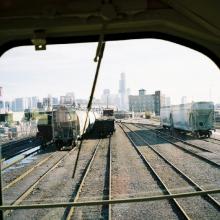
tb_lastdaynorthave_01022007_06
The SW-8 gently rolls down the track to the awaiting freight cars left by UP for the Chicago Terminal Railroad.tb_lastdaynorthave_01022007_06
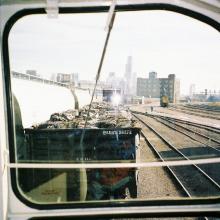
tb_lastdaynorthave_01022007_07
Just a few feet away are the freight cars to be picked up and delivered to General Iron Industries and Big Bay Lumbertb_lastdaynorthave_01022007_07
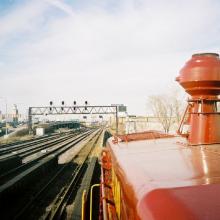
tb_lastdaynorthave_01022007_08
The train moves forward out of the North Avenue Yard and towards the Mill Yard where it will reach home rails. At the Mill Yard are some gondolas for Finkl Steel that will be picked up on Thursday.tb_lastdaynorthave_01022007_08
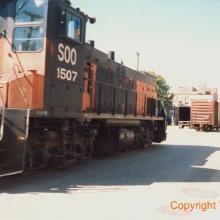
tb_midwestzinc_101989_01
On a sunny, early October day in 1989 the Soo Line crew is working Midwest Zinc on Kingsbury south of North Avenue. The MP-15, still in Milwaukee Road colors, shoves the boxcar with the new load in it ahead, parking it in the middle of Kingsbury for the time being.tb_midwestzinc_101989_01
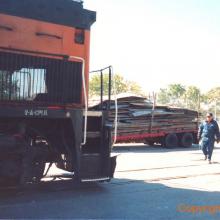
tb_midwestzinc_101989_02
The conductor throws the switch in the street, allowing the locomotive to travel down the spur to Midwest Zinc where it will pick up an empty Southern boxcar. Once it retrieves the empty boxcar it will swap it out with the new boxcar. Midwest Zinc's spur could hold two freight cars at a time which were protected by chain link fences and gates with barbed wire on the tops.As of 2007 this spur is still in place though Midwest Zinc is long gone. A vacant lot sits in its place awaiting redevelopment. To the best of my knowledge, Midwest Zinc received its last shipment via rail in 1998 and it was torn down a short time later. Midwest Zinc was the last online rail customer south of North Avenue on the C&E Line.
tb_midwestzinc_101989_02
As of 2007 this spur is still in place though Midwest Zinc is long gone. A vacant lot sits in its place awaiting redevelopment. To the best of my knowledge, Midwest Zinc received its last shipment via rail in 1998 and it was torn down a short time later. Midwest Zinc was the last online rail customer south of North Avenue on the C&E Line.
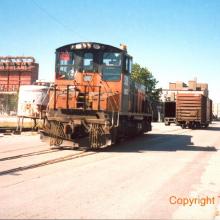
tb_midwestzinc_101989_04
Evidence of past derailments are still visible in the concrete around the switch.tb_midwestzinc_101989_04
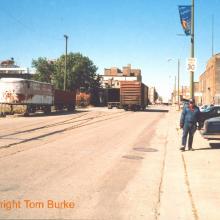
tb_midwestzinc_101989_06
Chicago Terminal Railroad reopened rail service on this section in 2007.tb_midwestzinc_101989_06
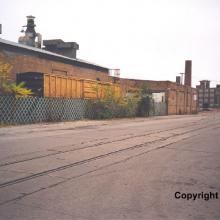
tb_midwestzinc_nov_1998
This photo was taken in November of 1998 and shows a boxcar witting on the Midwest Zinc spur while the company was still in operation at their Kingsbury Street location.According to a January 17, 2001, issue of American Metals Market parent company Imco Recycling Inc., dba US Zinc of Houston, shut down the Chicago Midwest Zinc plant that same month. US Zinc acquired the plant from Sipi Metals in 1983. The same article stated that Midwest Zinc was a buyer of zinc scrap and other metals. The zinc oxide produced was used in making tires and other rubber products.
Presumably rail service to the plant took place right up until it closed in early 2001.
A February 9, 2006, article in the Chicago Sun-Times stated that the site would be the home of a new, 80,000 square foot grocery store. It was to replace a smaller Whole Foods store at nearby Sheffield and Kingsbury.
On May 1, 2007, a development group called The Shops at Kingsbury Square LLC filed an adverse abandonment petition with the Surface Transportation Board for the section of track that runs down Kingsbury south of North Avenue to almost Division Street on the southeast. They claim this move is necessary in their petition to allow them to remove the former Midwest Zinc spur that runs into the property off Kingsbury and the easement that the new Chicago Terminal Railroad holds. It is unclear if this development group replaces the earlier Whole Foods development or if is one and the same and operating on behalf of Whole Foods.
tb_midwestzinc_nov_1998
According to a January 17, 2001, issue of American Metals Market parent company Imco Recycling Inc., dba US Zinc of Houston, shut down the Chicago Midwest Zinc plant that same month. US Zinc acquired the plant from Sipi Metals in 1983. The same article stated that Midwest Zinc was a buyer of zinc scrap and other metals. The zinc oxide produced was used in making tires and other rubber products.
Presumably rail service to the plant took place right up until it closed in early 2001.
A February 9, 2006, article in the Chicago Sun-Times stated that the site would be the home of a new, 80,000 square foot grocery store. It was to replace a smaller Whole Foods store at nearby Sheffield and Kingsbury.
On May 1, 2007, a development group called The Shops at Kingsbury Square LLC filed an adverse abandonment petition with the Surface Transportation Board for the section of track that runs down Kingsbury south of North Avenue to almost Division Street on the southeast. They claim this move is necessary in their petition to allow them to remove the former Midwest Zinc spur that runs into the property off Kingsbury and the easement that the new Chicago Terminal Railroad holds. It is unclear if this development group replaces the earlier Whole Foods development or if is one and the same and operating on behalf of Whole Foods.
